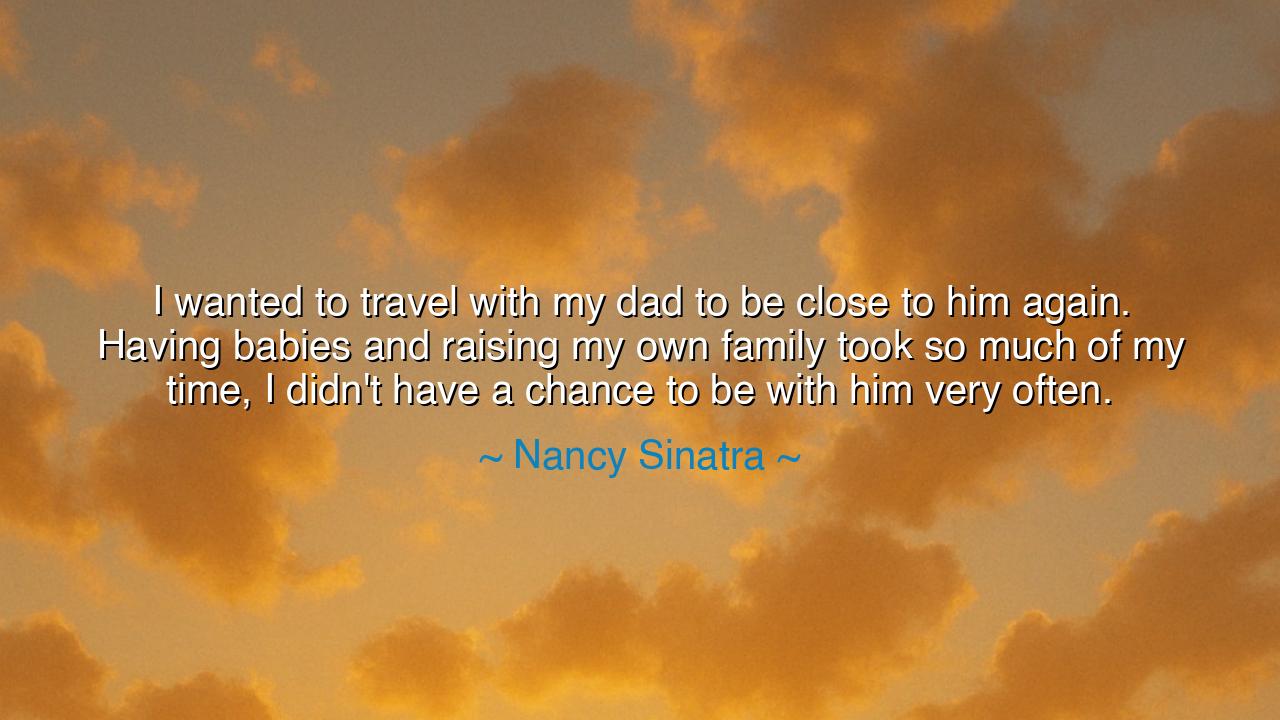
I wanted to travel with my dad to be close to him again. Having
I wanted to travel with my dad to be close to him again. Having babies and raising my own family took so much of my time, I didn't have a chance to be with him very often.






The words of Nancy Sinatra shine with tenderness and longing: “I wanted to travel with my dad to be close to him again. Having babies and raising my own family took so much of my time, I didn’t have a chance to be with him very often.” These words, though soft in tone, resound like a hymn of love and regret, carrying the eternal truth that time is fleeting, and the bonds of blood, though deep, can be strained by the demands of life. They remind us that the truest journeys are not to distant lands, but into the hearts of those we love.
From the days of the ancients, the relationship between parent and child was held as sacred. Kings raised monuments not for conquest alone, but to honor their fathers. Sons and daughters carried the names of their ancestors as living legacies. Yet even in the oldest times, it was known that the duties of life—whether war, work, or childbearing—could pull families apart. What Nancy speaks here is not unique to her, but universal: the ache of desiring closeness with a parent after the busy seasons of one’s own responsibilities.
Consider the tale of Telemachus in Homer’s Odyssey. As a child, he was separated from his father, Odysseus, who wandered far on his endless journey home. Telemachus grew in his absence, taking upon himself the burdens of household and survival. Yet within him burned the longing to know his father, to sit with him, to share the intimacy of family. When at last father and son were reunited, the years of separation fell away, and they found joy in one another’s presence. In Nancy’s words, we hear the same yearning: not for fame, not for riches, but for the simple and profound gift of closeness with her father.
The meaning of the quote is layered with love, sacrifice, and the tension of duty. Nancy’s time was consumed by raising her own babies, by building her own family, a noble labor that demands much of the heart and body. Yet in giving herself fully to her children, she found that space to be with her father grew smaller. And so she sought to travel with him, to reclaim what time had stolen, to bind once more the threads of kinship before they frayed too thin. This is the wisdom of love: that even when years are lost, effort can still be made to restore what is most precious.
Her reflection is not one of despair, but of recognition. She names aloud what many hide in silence: that the balance between family of origin and family of creation is not always easy to keep. Yet within her words is also a call to awaken—to see the fleeting gift of parents and loved ones before it is too late. For no riches, no achievements, no worldly gain can replace the embrace of family.
The lesson for us, then, is plain and powerful: make time. Do not let the demands of duty blind you to the treasures of relationship. Work will always call. Children will always need. Life will always be busy. But parents, elders, and those we love will not always remain. If you can, sit with them, walk with them, travel with them—not to far places necessarily, but even down the simple roads of shared memory and daily conversation. For in these small journeys lies the greatest closeness of all.
Thus, let this truth be handed down: the road of life is not only meant for labor, but for love. To raise a family is sacred, yet to forget the ones who raised you is sorrow. Bind the generations together—children with parents, parents with children—so that none are left in loneliness, and all may share in the fullness of love. Like Nancy Sinatra, seek the journeys that restore closeness. For in the end, these are the travels of the heart, the only journeys that endure beyond time.






AAdministratorAdministrator
Welcome, honored guests. Please leave a comment, we will respond soon